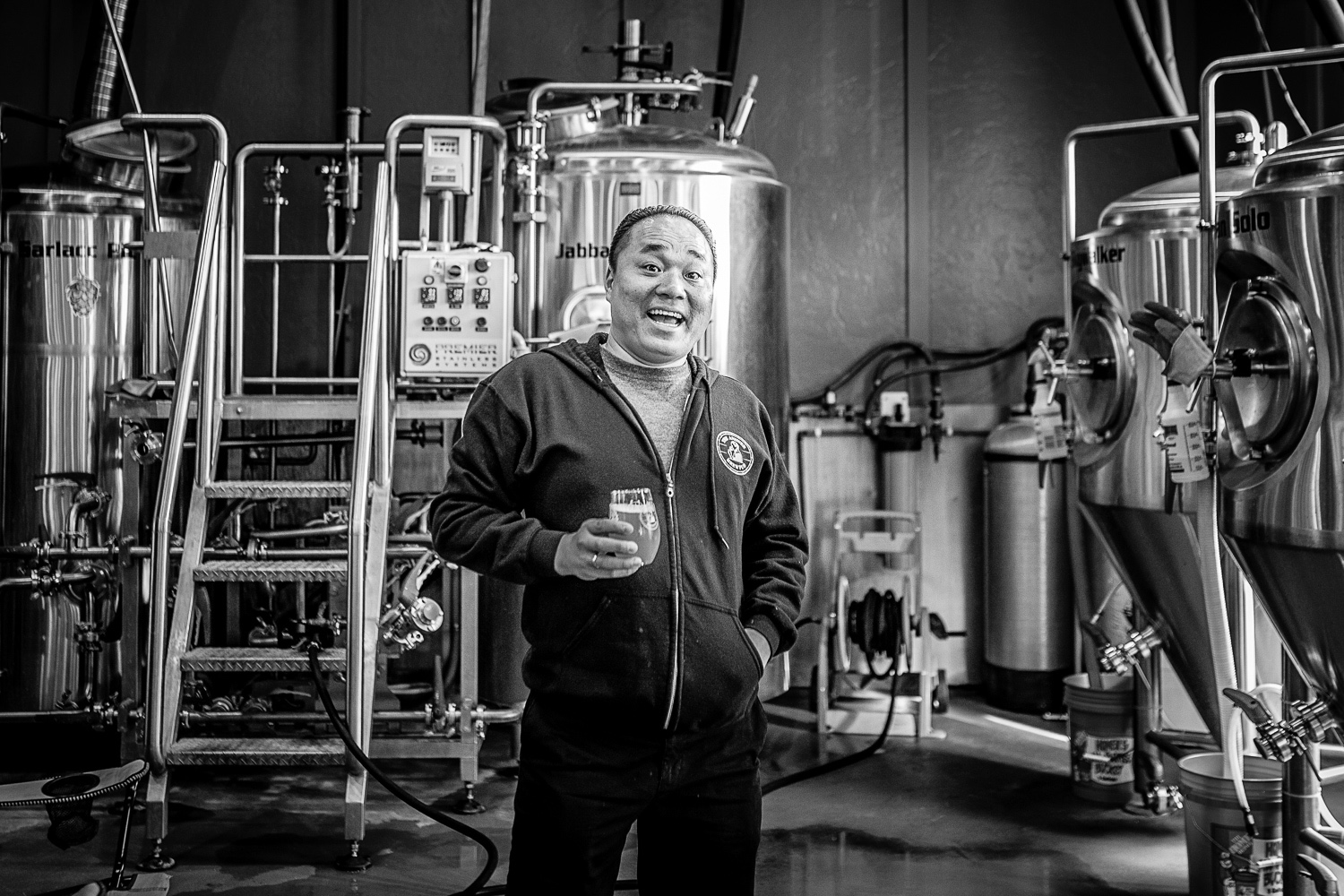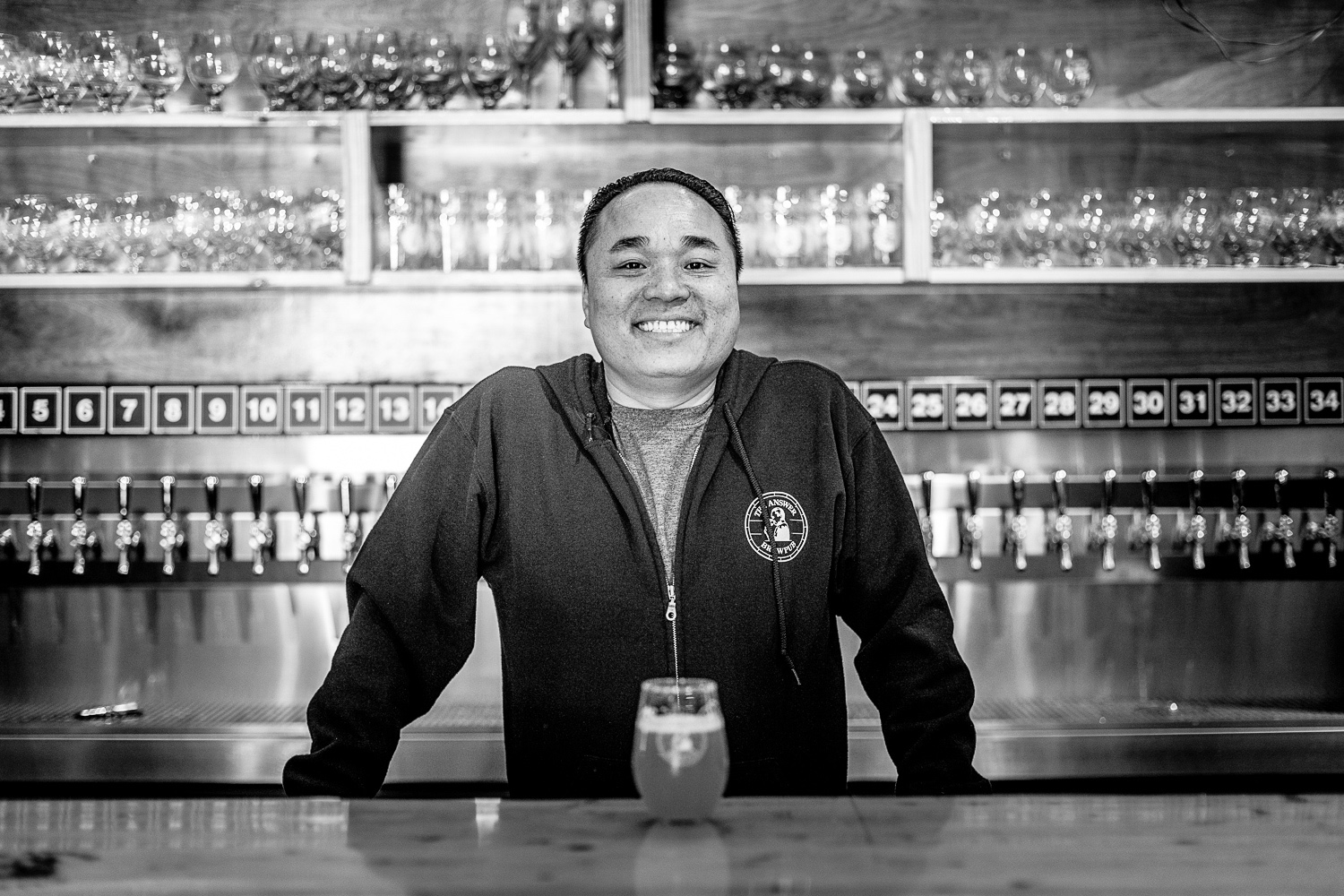An Bui never set out to be a beer guy. When his family opened Mekong Restaurant in 1995, beer wasn’t even on the menu. But when the economy collapsed in 2007, Richmond, VA did not escape unscathed. Mekong’s staff—and their wages—took top priority, and that required continued patronage, a difficult proposition as family budgets tightened. Bui needed something that paired well with his Vietnamese menu and was easy on people’s wallets. Beer, as it turned out, was the answer.
The early days of Mekong’s beer program were modest, just a smattering of Belgian bottles. But customers took to them, and eventually those bottles gave way to a small tap system, which later gave way to an even bigger tap system—56 of them to be exact. As the handles grew in number and became more varied, so too did the visitors. Soon, it was as popular a destination for people seeking adventurous pours as it was for those craving spring rolls and pho. By 2012, Bui had built an award-winning beer program, all within the confines of a Vietnamese restaurant located on a relatively nondescript stretch of West Broad Street.
So maybe it wasn’t so surprising when Bui announced he’d be opening his own brewpub, The Answer. Situated next door to Mekong, it offers beer lovers yet another dizzying array of choices. The additional 60 taps feature both in-house brews and rotating guest lines.
GBH sat down with Bui right before a long, busy July 4th weekend. He came bounding into the room—jovial, gregarious, and eager to chat. We opened a triple-dry-hopped IPA called Mind Games, and headed to his upstairs office to map the route from Vietnamese restaurant proprietor to brewery owner.

For many, the path to opening a brewery is somewhat similar. Not yours, though! Were people initially skeptical about a restaurateur-turned-brewery-owner? What were the reactions like?

First thing is we have a fanbase at Mekong. And once people found out I was opening a brewery, they were ecstatic. They thought, “Oh, what is An going to bring us?!” Mekong had become a landmark, a beer place to go. People were excited.

When you started Mekong, was beer on your radar?

No, not at all.

So, how did that happen?

We opened in 1995. The first two years we started with wine, trying to pair wine with food. And that’s tough. Vietnamese food is spicy, and the wines that were popular in town didn’t really work. Those were merlot, chardonnay, cabernet—they didn’t pair well. So we took a risk and tried to see if we could pair beer.

And you started with strictly Belgians, right?

Yeah, we did Belgian Blondes, Belgian Saisons, and you know what? Spicy food did pair well with those beers. But this town didn’t know a lot about beer. So the restaurant said, “Okay, let’s commit An to building the program one brick at a time. Just trying to get one person to try beer and then maybe we can build from there.” So we slowly built a foundation, offering free tastings and such.

I’ve interviewed Rob Tod from Allagash, and he started right around that time. Craft beer wasn’t then what it is now. It was difficult to get people to try beer.

Good that you brought that up. Rob Tod’s beer was one of the first we carried. We had 12-packs and 750s of White, the Dubbel and Tripel. We carry their White to this day, and I believe we’re still one of their top accounts.

When you started, did you have as many taps as you do now?

We started out with just bottles. The housing market crashed around 2007 and the business took a bit of a dip, so we had to figure out what we were going to do, what’s our next step. We were trying to save the place, not have to lay people off or cut their salaries. So that’s when they committed to draft beer. We bought a used kegerator for $500. It was three taps but we switched it to six taps. We ran that for a couple of months and it was so popular we thought, “Well, people demand more, let’s buy another kegerator!” We bought another one, put six more taps on for 12 taps. And that still wasn’t enough! [laughs]

You went from bottles to a small tap list to a large one, and in a relatively short amount of time, you went on to win awards as one of the best beer destinations on the East Coast. How did that happen?

I don’t know that we’re the best. But I think every place has their fanbase, and I think our fans are very passionate. I always tell people, you always have your favorite spot, there’s that place you always go to. We’ve always kept our prices very low, we keep our draft portfolio very diverse.

For years, Mekong has been known for having a reputable beer program that you spearheaded. How did this prepare you for owning and running a brewery?

The best part was the learning, the knowledge I got at Mekong. I feel like I understand the beer drinker. “This is what people want.” At the time of The Answer, what they really wanted was fresh IPAs. So we were thinking about how we could brew a beer and then transfer it to the brite tank and serve it right from the tank, as fresh as can be. So that’s what was in my head, that I needed to start the brewery and share that with the fanbase.

It sounds like you may have had a desire to own a brewery, but what it really sounds like you wanted was to reward your fanbase.

Well, you know, I’m part of the fanbase. I love beer, I love hanging out with everyone. So you’re always talking to people and figure out what they want.

When you made the leap to opening a brewery, what was your biggest challenge, the obstacle you didn’t see coming?

The biggest for me was going from a family business to a non-family business. I had to hire everyone from outside of my family. I had to hire people that I believed and trusted. It was different to go from family trust to trusting an outsider.

What do you do at Mekong versus The Answer?

What I’ve always done, really, buying beer for both places. That’s always been my passion. That’s always been close to my heart. I think people relate to me, I think when they come in, they trust what I pick.

You opened in the space directly adjacent to Mekong. Did you feel it made sense from a business standpoint to be close by? Was that happenstance?

In the beginning we weren’t thinking about opening anything else. This space was always a nightclub. They were only open Friday and Saturday. Sometimes it was weird to see the nightclub crowd bumping into our family crowd. But one day the owner approached me to see if I’d be interested in taking the space, she didn’t want to do it anymore. So I told her that I’d help find someone for her.

You weren’t thinking about the brewery at that point?

No, I wasn’t thinking that. But I went home and slept on it and thought, the rent is cheap, the space is next door, maybe we could get a brewpub going. So I went and asked her how much she wanted for the space. We restructured the lease and that was that.

When you told people that you wanted to open a brewpub, your wife for instance, what was the reaction?

She couldn’t believe it. She just shook her head and said, “You’re crazy.” [laughs]

How long from the time you signed the lease to opening day?

It took us eight months to renovate, and during that time frame, we ordered the brewing equipment. Once we got the pub opened up, we focused on the brewery.

Your brewer is Brandon Tolbert. How’d you meet him?

Brandon was a homebrewer. We have a homebrew meeting at Mekong the second Wednesday of every month. My thinking was not only do we focus on beer, we should help grow the community. So we started hosting the homebrewers.

So, it’s a sampling thing?

Yeah, they come in and try everyone’s beer, they pick a subject to talk about. Brewers will give them beers to sample, stuff like that.

You knew even back then that you wanted to foster the local beer scene?

Once we started carrying all of the beer next door and trying to build that fanbase, I had this dream that if Portland or Denver or Grand Rapids can have a beer scene, why can’t Richmond be on the beer map? That’s when I started wondering what I could do to push that. So I started doing beer tastings, hosting the homebrewers, things like that, hoping one day it might happen. And here I am witnessing it happen—the explosion of the beer scene here.

Richmond is certainly a well-established beer scene now. Where did you feel you would fit in, what did you have to offer?

For us, fresh is everything. Fresh IPA is big, but even fresh coffee in a Coffee Stout. To us, it’s just about freshness and flavor.

What experience or interactions did you have with breweries or brewers that made you want to run one yourself?

I’d say hanging out with the folks at Cigar City. Spending time with those guys I saw their passion. We went down there and saw the process, how they brewed and I thought to myself, “That’s pretty cool.” And then hanging out with the homebrewers every month. That’s how I met Brandon. I tasted the IPA he brewed and I thought he had something. I told him he had something in him and pushed him to go commercial.

The Answer is the first place he brewed commercially?

No, there’s a local brewpub in town that needed a brewer, so we pushed him that way to go brew and get some experience. He went there to learn what he could and continue to finesse his recipes. And when we opened this place, we brought him over. He’s now a great ambassador for Richmond. He travels around collaborating with people.

The Answer seems to be IPA-centric. But what also seems to get people excited are your special creations, your “Andalled” beers. How did creating those beers start?

The Andall was created over at Mekong about seven years ago. That was an idea borrowed from the Dogfish Randall. For a while, Capital Ale House and us were pretty much the only two beer spots in town. They were doing some Randall stuff and I tasted it and thought it was interesting. I thought it was good and fresh, but I felt like something was missing. The first few were good, but then the flavor would fade and the beer would be flat.
So I thought, that’s good, but it’s missing something. We’d do a couple next door, but I felt we needed more, we needed more carbonation, and the beer needed to last for a whole keg. So I played around and I took the same idea, but did it different. I took a pony keg, and what I do is, I take the mesh bag and use that for coffee or coconut or whatever, instead of hops, and just let it soak. And that’s the in. On the out, I just connect it to the draft line. So you push gas into the real keg, pushing the beer into the next keg, and push that out, so it’s continuous.

Do you know of anyone else doing that?

I have no idea! [laughs] A lot of the ideas come from the homebrew club too, we’ll taste something there that will trigger an idea.

The Answer not only serves your house creations, but also has a number of taps devoted to other breweries, as does Mekong. As a beer lover, this makes a lot of sense, but as a brewery owner there must be some conflict there. How do you balance being a beer lover with the desire to champion your own product?

That’s a great question. Lucky for us, we have a small system, so we brew mostly IPA. We try to keep it the freshest we can. So our tanks are always filled with IPA, but we’ll do a Stout here and there. We do IPAs twice a week, a Stout maybe once or twice a month. So for us, it’s like what can we supplement with the stuff we can’t brew. Now that we have an IPA and a Stout here and there, we need to carry other stuff we don’t brew—Pilsner, Porter, Brown Ale, ESB, Belgians, sours.
That adds up to about 50 guest lines. So there’s actually no competition, we just try to round our lines with others people’s beer. Instead of us brewing 30 beers, why don’t we focus on what we do best for our clientele, our fanbase, and then from there, we carry the best of what other breweries do.

How have the house creations been selling?

I think we have the right system here, a 5-BBL. When we first brewed, a batch of beer took about two weeks to empty and now it takes a week, maybe less. We’re now brewing two batches a week, we used to do two batches a month.

The clientele at Mekong vs. The Answer—the same, different, overlap?

We have an original clientele that we’ve built over 20 years, they’re rock solid. They still float over to check out this place. [At The Answer], it’s the new beer and the food menu is a bit different, the space is bigger. This and next door create a beer destination for us. People will bucket them together, they’ll check out Mekong and then come over and drink a beer. It’s kind of like you park in one space and check out two places. It’s a benefit for us.

Can you ever envision a scenario where you have to give up either Mekong or The Answer in order to focus? Which would you choose?

Not unless we closed the doors on both places! [laughs] It comes down to passion. I love both places. Mekong is pretty attached to me and this place reignited my passion.

Richmond has been a local-centric beer town for a while, going back to Legend Brewing opening in 1994. Now, it’s home to an outsider, Stone. How does their entry into the Richmond market impact your business?

At first I thought they were going to help us, with a sort of boom, a big impact. But, surprisingly, they haven’t. I guess they haven’t fully rolled out the whole package they plan to do on the East coast. They’ve had the brewery going on for about a year now, but I guess the bistro is what creates a lot of tourism. I think next year or the following year they’ll be done. It’s right by the river, they have a nice piece of land. But they haven’t had an impact on the scene yet. The bigger impact on the scene has been Hardywood, The Veil, and Triple Crossing—the locals have had the biggest impact.

Your motto is “Beer Is The Answer.” What’s Richmond asking that needs an answer, what’s missing from the scene? What would you like to see?

We definitely have the IPA game down, four or five places pumping out good IPAs. With more than 200 breweries in Virginia, at some point we need to have more uniqueness. I’d like to see places focus on Saisons, barrel-aging programs, make it more of an art. To make this a great beer town, we need more uniqueness, just try to have more diversity.













